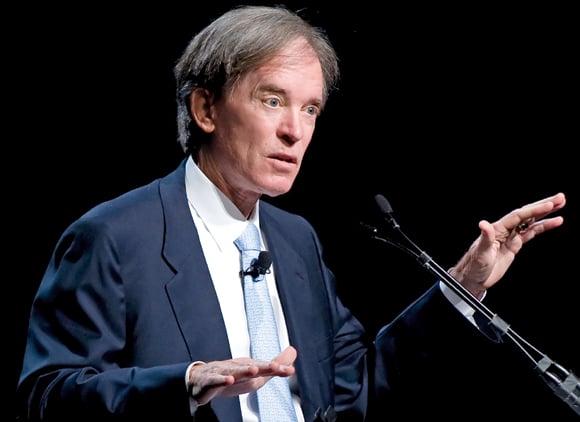With inflation looming, bond funds begining to purchase equity-linked debt; little downside to upside protection
Pacific Investment Management Co. and Loomis Sayles & Co. are betting convertible debt will rally as stocks rise and Treasuries fall.
Bonds that may be exchanged for shares returned 16.8 percent last year, beating Treasuries, benchmark U.S. stock indexes, high-yield and investment-grade corporate notes and municipal debt, Bank of America Merrill Lynch index data show.
Fixed-income investors are turning to convertibles amid signs the U.S. economy is improving. While the Standard & Poor's 500 Index gained 10.76 percent in the fourth quarter, including reinvested dividends, Treasuries lost 2.7 percent. The Pimco Total Return Fund, the world's largest mutual fund, is allowing investments in equity-linked securities for the first time since 2003. The $19.4 billion Loomis Sayles Bond Fund, which beat 98 percent of fixed-income funds in the past five years, is also investing in convertibles.
“You're starting to see for the first time interest rates tick up a little bit, and people are realizing what happens in their fixed-income portfolios when that takes place,” said Justin Kass, a money manager who helps oversee $2.8 billion of convertibles at Allianz Global Investors Capital in San Diego. “We've been a big beneficiary of shifts in the past three months in terms of flows in our growth funds.”
Sales of convertibles may soar to $50 billion in 2011, closer to “historic levels,” said Prasanth Burri Rao-Kathi, head of Americas equity-linked capital markets at Bank of America Merrill Lynch in New York. Issuance tumbled to $33.8 billion in 2010, the slowest period in 14 years.
Gains on convertible securities last year compare with 9.5 percent on high-grade corporate debt, 15.2 percent on speculative-grade company securities and 2.3 percent on state and local debt, Bank of America Merrill Lynch index data show. The S&P 500 Index gained 15.1 percent in 2010, including reinvested dividends, while the Dow Jones Industrial Average advanced 14.1 percent.
Treasuries lost 1.8 percent in December, the worst performance in a year, Bank of America Merrill Lynch index data show.
Rising profits and cash balances will push the S&P 500 Index to the biggest three-year advance since the 1990s, surpassing forecasts for below-average returns, strategists at Wall Street's biggest banks said last month.
Futures contracts on the Chicago Board of Trade show a 31 percent chance Federal Reserve policy makers will raise their target rate for overnight loans between banks by at least a quarter-percentage point by their November meeting. The Fed has held the target at zero to 0.25 percent for more than two years.
“If you think stock prices are going to be higher and it's going to be driven by an overall high level of prices in general because of an uptick in inflation, I would probably say I want bonds that give me some upside to the pricing environment,” said Daniel Welch, a New York-based managing director who oversees convertible sales and trading at brokerage Piper Jaffray Cos.
The Pimco Total Return Fund may put as much as 10 percent of assets in securities including preferred stock and convertible bonds as soon as the second quarter, the Newport Beach, California-based money manager said in a Dec. 16 regulatory filing. The fund won't invest in common stock, it said.
“If you look at what the biggest player in the bond market is doing, it gives you an indication of what the trend is going to be,” Welch said. “There's a reason Pimco is looking at equity-linked products and making a push there.”
The Loomis Sayles Bond Fund owns convertible securities, which can be exchanged for common shares at a premium to the market price, from Intel Corp., Valeant Pharmaceuticals International Inc. and Ford Motor Co., Bloomberg data show.
“Rather than going too far down in quality, we're saying we'll take some equity risk,” said Kathleen Gaffney, a Boston- based co-manager of the Loomis Sayles Bond Fund. “What we're trying to capture is good cash flow and growth in earnings.”
A stock market rally in December triggered conversion rights on securities from Hertz Global Holdings Inc., the largest publicly traded U.S. rental-car service, and Gaylord Entertainment Co., owner of country music's Grand Ole Opry, according to separate statements from the companies yesterday.
Convertibles are typically attractive to issuers when companies don't expect a gain in their equities to trigger a swap, adding to outstanding stock and cutting the stake of existing shareowners.
“Investors are looking for yield and they want to be invested in equities, but some of them are nervous to take on the whole equity risk,” said Ellen Gold, co-manager of the $165.3 million Invesco Convertible Securities Fund. “So we're seeing investors who are using the convertible market as a way to play equities with downside protection.”
--Bloomberg News--







